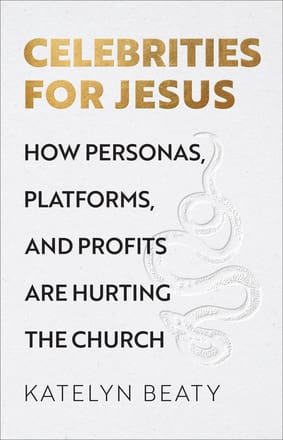T
The old adage that “power corrupts” does not include a Christian exception clause. This becomes glaringly obvious after reading Katelyn Beaty’s Celebrities for Jesus. The fact that concentrated power tends to corrupt—yes, in the church too—can’t surprise any student of history. But why look at the worst outliers when there is so much more faithful work happening largely in obscurity? Isn’t it unseemly to make family failure your brand? After lining up some of the most unsavoury characters of the past several decades, Beaty might be accused of “nutpicking,” indulging in the gory “pastors gone wild” stories with too much schadenfreude. “Have a little respect,” critics might chide the sometimes flippant, serially sassy Beaty.
But they would be wrong. And they would be wrong because Beaty’s book is not really about individuals, although they make up the bulk of her cases. Beaty’s book, implicitly at points, and explicitly at a couple critical ones, gives some deserved nudges toward Philip Zimbardo’s Lucifer Effect. The problem she has her eye on is not the apples, who get enough press from their own misdeeds. It’s the barrel. The aughts’ anxiety was that evangelicals were too “individualist,” and had lost faith in institutions. As it turns out, evangelicals never so much lost faith in institutions, nor were they blind to what powerful, magnifying forces institutions could be for their work. The problem wasn’t the joining; it was the why, and once joined, the how. The problem, in other words, was ethics. And the “how” turns out to be where institutional integrity lives or dies.
American Evangelicalism’s Dangerous Pragmatism
The sociology of celebrity takes up some deserved pages in Beaty’s book. She worries, for example, that American evangelicals have prioritized individuals over institutions, and that institutions are more likely to serve as “platforms for performance and prominence” that “leaders use to elevate their public image and their brand than as sites of collective good work and societal transformation.” Institutions-defender heavyweight Yuval Levin makes an appearance, arguing the American church copies rather than subverts contemporary trends in Congress. It is, in other words, an all-American problem.
Where the argument gets more interesting, however, is when we begin to ask ourselves why these leaders are platformed in the way they are, why their sins are overlooked, why organizational and ethics constraints are systematically deconstructed around them. You can tell the easy story about a few bad apples, but Beaty argues—believably—that few people enter Christian ministry with this kind of egoistic pragmatism. What happens to evangelical leaders such that they so often become sullied, and how does it happen?
Institutions are not just what they do, they’re how they do it.
Beaty reflects on the Modesto Manifesto, whose most spectacular part—“the Billy Graham Rule”—has been especially stigmatized in recent years. She says that while most evangelicals were distracted with sex in the right hand, power and money were in the left. The Modesto Manifesto included some ill-fated gender advice, but it also included some sober financial and organizational rules. It made whatever celebrity was mustered subject to something greater: a board, a rule, an audit.
Institutions, Beaty points out, are not just what they do, they’re how they do it. It is easy for religious organizations to see the goal of their work as so essential that pragmatism has a dangerous way of seeping in: souls need saving, wells need digging, homeless need feeding. That mission ends up taking on such an existential priority that sometimes a few corners need to be cut, a few minutes redacted, a few misdeeds overlooked. We must be committed to the greater good.
Masquerading under the guise of shepherding a mission, much pragmatic justification goes undetected. Celebrity is the least of the problems such mission-minded, well-intentioned institutions might overlook. That pragmatism also seems prevalent in the increasingly casual usage of non-disclosure agreements on the part of Christian not-for-profits precluding—as they seem to—transparency and accountability when relationships break down. Then there are mistakes people make, sometimes senior people. Sins they didn’t expect to affect their work, but do. They intended well, or they were victims of their own busywork and exhaustion, itself often a consequence of bad boundaries, misallocations of funds, or chronic under-resourcing. To “air the dirty laundry” would only hurt the mission, so we roll out some non-disclosure agreements, put our increasingly beleaguered human resources (if we have them!) to work, and make it all go away quietly. God’s kingdom lives to fight another day.
This isn’t quite the same loss of institutions that Levin has in mind. Evangelicals didn’t stop joining institutions. The institution and its mission are paramount, powerful even. What has been lost, if we ever had it, is the social ethics. We have forgotten, as the great American ethicist Paul Ramsey reminded us, that “it is never right to do wrong that good may come of it.” Ramsey was talking about war. I should think his advice would be easier to follow off the battlefield.
The Embarrassment of Power
Power needs ethics. Stories from Mars Hill, L’Arche, Willow Creek, Ravi Zacharias International Ministries, and more are rightly focused on the damage that powerful people can do to vulnerable congregants and employees, but believe it or not, that abuse is not the primary damage of a collapse in ethics. Good boundaries, proper accountability, and full transparency not only protect other people from me but also protect me from myself.
Beaty offers a short theology of power, and it’s not a bad place to start. Citing Andy Crouch, she argues that power is not itself an evil, or even a necessary evil, but a gift. Humans are gifted with power to do some good, to serve each other and the creation. This is a good way to start a power audit: look at what that power is for (its telos) and measure the success or—dare I say it—flourishing of that good.
“Fame itself is not sinful,” says Beaty. But it is a kind of power. We might think of Weber’s charisma. Or we might think of political power, which invokes some old-fashioned terms like “public service.” We might think of financial power: Wealth, hardly a sin in itself, is yet a power we are consistently warned by the Gospels to discern.
What may be a minor irritant becomes with power and scale a social catastrophe.
The point is not that power is good instead of evil. It can be. Nor is the point that power is neutral, that it just depends on who uses it. The fact is, power changes things. It pushes human behaviour, it nudges us, it enlarges, it scales, it tempts. It makes possible some things, and it scales up—or diminishes—others. What may be a minor irritant becomes with power and scale a social catastrophe.
The point is that power needs ethics because humans cannot and should not be trusted. Even Christian humans. I would not say especially Christian humans, though it might seem that way from Beaty’s book. It seems that way, I think, because evangelical Christians are startlingly naive about power due to this relapse in social ethics. “Such a community,” Reinhold Niebuhr wrote, “creates a culture in which nothing is officially known about power, however desperate may be the power struggles within it.” Power corrupts, we chide our political masters, while forgetting that power takes many forms, including the planks in our own eyes. Spirit-baptized and forgiven sinners surely do not need the same institutional safeguards as the pagan politicians and Wall Street speculators, right?
The scandal at the heart of Beaty’s book is the enabling organizations and the collapse of institutional ethics—a dangerous pragmatism married to a startlingly idealistic naïveté.
I am sorry to report: they do. And perhaps because of their naïveté they need them all the more desperately. Beaty’s adventures in abuse of power are so startling not because Christians don’t fail, but because Christians should expect failure more. Who knows and confesses the wicked inclinations of the human heart more than the Christian? Who knows what desperate depravity is nestled into souls, from which no power inside ourselves can rescue us, better than our sacred Scriptures? Who could ever imagine that power untethered from ethics, from accountability, transparency, and fidelity, would ever not end in corruption and scandal? Not a single student would graduate from a freshmen course in politics if they got this question wrong. And yet senior evangelical leaders all over America are baffled.
The pagan world has grasped that boundaries are for everyone. Evangelicals could do worse than borrow from what scholars of political power have known now for generations. For best results, for just results, distribute power, keep it accountable, be transparent, and cycle it regularly. Those hard-won truisms of political wisdom encapsulate some of the best of what we might call liberal democracy.
Why Christians Need Robert’s Rules
Beaty’s book starts us down this road, and concludes with some good advice about obscurity and ordinary faithfulness. But I think the importance of Beaty’s book is the conversation it opens about ethics in institutions, not (just) pious personal practices. The scandal at the heart of her book is not the celebrity pastors; their corruption and scandal is the least interesting and most predictable part of the package. The scandal is the enabling organizations and the collapse of institutional ethics—a dangerous pragmatism married to a startlingly idealistic naïveté. Being faithful with the little things is good advice. But let’s turn that advice to where it’s most badly needed: our social ethics.
What would a recovery of ethics in evangelical institutions look like? It might begin with a diminishment of celebrity. But Tim Keller, in an interview with Mike Cosper at the end of his troubling Rise and Fall of Mars Hill podcast, doesn’t suggest that a diminishment in celebrity is inevitable. Nor does he suggest that his so far largely unscandalous career is the fruit of any special and heroic faith on his part. Keller’s answer is what the late Michael Gerson called “the banality of goodness.” Keller is a pastor in the Presbyterian Church in America, and the Presbyterian Church in America has rules. And he had to follow them. Rules are for Tim Keller too.
If we are leaders, our organizations owe us rigorous and unapologetic boundaries—on paper, written, checked, reviewed. They owe us what we in the Westminster tradition call “loyal opposition.” Power works on human hearts, and it is one of these gifts of God that must be exercised in community, in proximity. Without that, no matter how good your prayer journals and your Bible plans are, the odds are you’ll make Beaty’s next edition.
It’s the boring answer, but it is unimaginably crucial. And while readers of Comment magazine are not all in the C-suites, I wager we’re disproportionately invested in institutions. We sit on boards, church councils, school committees; we set up for the Christmas bazaar. Here are a few rules for how we can—and must—serve our leaders, and begin to recover institutional ethics:
- Read the institution’s document bundle (seriously). Cover to cover. Make the time.
- Take minutes. Pay attention.
- Follow rules of procedure. Those rules are not arcane proceduralism from wonks like me; they are hard-fought ground rules that protect us from each other. We need them. Too many people don’t know them and get hoodwinked, confused, or overwhelmed by them. Learn them.
- Read the by-laws. They’re not nearly as long as you think, nor are they as complex. Keep your eyes wide open for concentrations of power (especially “executive committees”).
- Read the charter or the organizing mission material. If it’s not written down, it should be.
- Hold the line. The fruit of the Spirit is also for board meetings, yes, but forbearance doesn’t mean overlooking mistakes or papering over perjuries.
Evangelicals expect a lot from our leaders. That’s fine. They should expect more from us. To be a “company man” is too often a pejorative for yes men and sycophants: A company man—a good employee and volunteer—owes the organization and their bosses their most mature judgment, their most capable diligence, and their most serious accountability. That’s the lesson I take from Beaty’s tales of sadness and villainy: Don’t let your pragmatic devotion to a mission—no matter how righteous—overlook your duty to your brother or sister.
The problem is not just them. It’s us.







